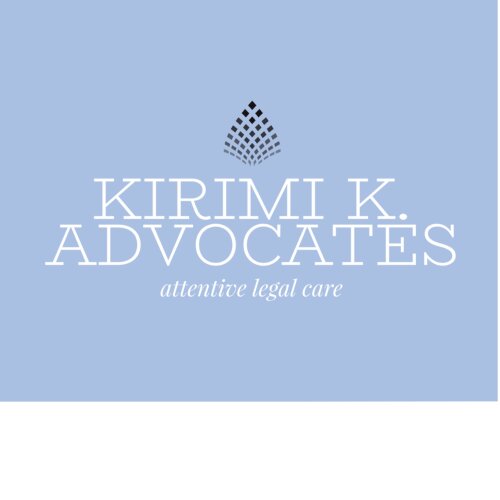Best Landlord & Tenant Lawyers in Kajiado
Share your needs with us, get contacted by law firms.
Free. Takes 2 min.
Free Guide to Hiring a Real Estate Lawyer
List of the best lawyers in Kajiado, Kenya
About Landlord & Tenant Law in Kajiado, Kenya
The relationship between landlords and tenants in Kajiado, Kenya, is governed by a combination of national legislation and local county regulations. At the core of this relationship is the agreement, often termed a lease or tenancy agreement, which outlines the rights and responsibilities of both parties. In Kajiado, as in many parts of Kenya, housing demand has grown, leading to increased tenancy engagements. Therefore, understanding the law is essential to ensure that both landlords and tenants protect their interests and fulfill their obligations.
Why You May Need a Lawyer
Legal issues in landlord and tenant relationships can arise from a variety of situations. You may need a lawyer if you encounter any of the following common scenarios:
- Disputes over rent payments or security deposits
- Eviction conflicts, whether facing an eviction notice or seeking to evict a tenant legally
- Breach of lease terms by either party
- Understanding tenancy renewal and termination procedures
- Resolving damage claims or maintenance issues
- Drafting or reviewing lease agreements to ensure fairness and legality
- Navigating local housing regulations and by-laws
- Dealing with tenant rights issues like unlawful discrimination or harassment
- Seeking to recover property or assert ownership rights
- Addressing subletting and unauthorized occupants issues
Local Laws Overview
In Kajiado, tenancy arrangements are primarily governed by the Landlord and Tenant (Shops, Hotels and Catering Establishments) Act, the Rent Restrictions Act, and the Housing Act, all of which are part of Kenya's broader legal framework. Key aspects of these laws include:
- Lease Agreements: Must be in written form to clarify the terms and conditions agreed upon by both parties.
- Rent Controls: Governed by law to prevent exorbitant rent increases in specific properties and circumstances.
- Eviction Procedures: Require landlords to follow legal procedures when evicting a tenant, often necessitating a court order.
- Security Deposits: Legal guidelines regulate how security deposits should be handled, including their return.
- Repairs and Maintenance: Establish the responsibilities of the landlord in maintaining habitable premises.
- Tenant Rights: Protect tenants from unfair treatment and discrimination.
Frequently Asked Questions
What should be included in a lease agreement?
A lease agreement should include the duration of the tenancy, rent amount and payment terms, security deposit details, responsibilities for repairs and maintenance, and other essential house rules.
How much notice is required to terminate a lease?
The required notice period usually depends on the terms of the lease agreement. If no specific term is detailed, the common practice under the law is to provide a notice equivalent to the rent payment period, typically one month.
What can I do if my landlord locks me out of my premises?
Illegal eviction, such as locking out a tenant without a court order, is not permissible. Tenants can seek legal redress through the court system to regain access and possibly claim damages.
Can my landlord increase my rent arbitrarily during the lease term?
Unless stated in the lease agreement, rent cannot be arbitrarily increased during a fixed-term lease. Annual increases may be subject to rent control regulations if applicable.
Who is responsible for repairs in the rented premises?
Typically, landlords are responsible for major repairs and ensuring the property is fit for habitation. Tenants may handle minor repairs unless otherwise agreed upon in the lease.
How can a landlord recover outstanding rent arrears?
Landlords can issue a demand notice and, if unresolved, file a case in court to recover outstanding rent through legal means.
What are the consequences of not vacating after a lease has expired?
Remaining in a property without renewing a lease or negotiating terms can lead to eviction proceedings. It is important to communicate with the landlord well in advance.
Can a tenant sublet to another person?
This depends on the lease agreement terms. Subletting without the landlord's permission could lead to a lease violation and possible legal action.
Are there laws protecting tenants from discrimination?
Yes, tenants are protected from discrimination based on race, gender, religion, disability, and other factors. Legal avenues are available to address such issues.
What action can I take if my landlord fails to refund my security deposit?
Tenants can seek the intervention of the Rent Restriction Tribunal if they believe deductions from the deposit are unjustifiable or if it's withheld without cause.
Additional Resources
For further assistance, you may consider reaching out to the following resources:
- The Kajiado County Government's Housing and Urban Development Department
- The Rent Restriction Tribunal for disputes involving regulated premises
- The Law Society of Kenya (LSK) for legal representation and advice
- NGOs and community-based organizations focusing on housing rights
- Citizens Advice Bureaus which can offer free initial guidance
Next Steps
If you require legal assistance in landlord and tenant matters in Kajiado, consider taking the following steps:
- Review your lease agreement to understand your legal position.
- Contact a lawyer with experience in landlord and tenant law to discuss your situation.
- Document all communications and transactions related to the dispute for reference.
- Engage with mediators or arbiters if possible to resolve disputes amicably.
- If necessary, prepare to file a case with appropriate legal tribunals or courts for resolution.
Lawzana helps you find the best lawyers and law firms in Kajiado through a curated and pre-screened list of qualified legal professionals. Our platform offers rankings and detailed profiles of attorneys and law firms, allowing you to compare based on practice areas, including Landlord & Tenant, experience, and client feedback.
Each profile includes a description of the firm's areas of practice, client reviews, team members and partners, year of establishment, spoken languages, office locations, contact information, social media presence, and any published articles or resources. Most firms on our platform speak English and are experienced in both local and international legal matters.
Get a quote from top-rated law firms in Kajiado, Kenya — quickly, securely, and without unnecessary hassle.
Disclaimer:
The information provided on this page is for general informational purposes only and does not constitute legal advice. While we strive to ensure the accuracy and relevance of the content, legal information may change over time, and interpretations of the law can vary. You should always consult with a qualified legal professional for advice specific to your situation.
We disclaim all liability for actions taken or not taken based on the content of this page. If you believe any information is incorrect or outdated, please contact us, and we will review and update it where appropriate.









